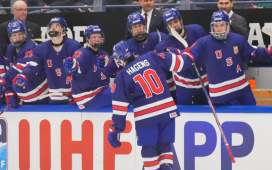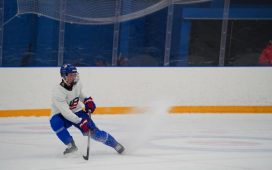There’s no ice and resources are limited, but with a rink on the side of a cliff in the middle of the Atlantic Ocean, it’s hard to find a more scenic place to play. This is the story of hockey in Bermuda.

There might not be a cooler place to play hockey than on the side of the cliff. But for Bermuda, that’s where the rink is located.
It may sound like a novelty to North American hockey fans, but it’s the only way for Bermudans to play in a proper ball hockey setting. Bermuda, a small nation with a population of 65,000 and residing nearly 700 miles from the closest U.S. state, has never played on ice before, and likely never will. Compared to powerhouse hockey nations, the island couldn’t get more tropical, with the gulf stream preventing snow from touching down. The two forms of hockey that are played in Bermuda are ball and inline, with a local league allowing players to get their fix. There will never be a feasible way to play on real ice, so why not have some fun with what they have?
“(There is) a 40-foot drop in some areas, maybe 50 down to like 10,” said goaltender Scott Steele. “So you can just go rock-drop jumping right after the game, swim over to a beach and walk yourself up to the rink again.”
The game found traction in Bermuda in the 1980s thanks to the help of a couple of Canadians on a converted outdoor roller hockey rink. In the 1990s, the Bermuda Ball Hockey Association was established, with the group hosting the semi-annual ball hockey tournament, the Robin Hood Cup. Like many players, Steele is a Canadian ex-pat hailing from Calgary, but one with no organized hockey experience prior to moving to Bermuda almost 12 years ago. Steele refers to himself as the program’s ‘Swiss Army Knife,’ playing the role of webmaster, backup goalie and assistant GM, among other things.
The current rink, measuring in at 165-by-80 feet, was opened in 2012 after a successful fundraising effort. The dream for a new arena was started by Tom MacNeil, the Bermuda Youth Inline Hockey League president, but he passed away due to a heart attack during a scrimmage in the makeshift space they previously occupied.

Around 100 players take part in Bermuda’s inline and ball hockey leagues. The national team is made up of players who can afford to take time off work and pay for travel, but the talent level continues to grow each year, Steele said. In June, Bermuda took part in the Ball Hockey World Championship in Kosice, Slovakia, organized by the International Street & Ball Hockey Federation. They played against fellow tadpole hockey nations Hong Kong, Armenia, Cayman Islands and Lebanon, losing 4-3 to the Lebanese in the 13th-place game. Bermuda has taken part in international play since 2001, traveling to countries such as Canada, Switzerland the United States and the Czech Republic.
The team is self-funded with no help from the government or a corporate sponsor, making growing the sport challenging. But despite being one of the smallest hockey nations, Bermuda has had success in international events. The team won gold in B Pool play in St. John’s, New Brunswick in 2013, their only tournament championship in the main men’s level to date. Bermuda also hosted the ISBHF Masters Championship in 2018 for players over 30 years old, missing the semifinals by a single point.
To train for these tournaments, players split the year between inline and ball hockey under the guidance of the BBHA. Each season, team captains pick players based off of an auction format, with the cost of each player depending on experience. Currently, the inline league plays host to four teams named after junior hockey teams, including the first-place London Knights and last-place Windsor Spitfires. The federation is currently working towards growing its youth league, with some players following through all the way to the men’s national team. And while the goal is to ultimately be competitive in the international sphere, Steele sees value in keeping the game fun for everyone.
“Our ultimate goal is to be competitive on the international level, but we just have a bunch of guys who want to get together once or twice a week to play some hockey,” Steele said. We’re all professionals. There are no hotheads. We all have to go to work the next day. We have a lot of CFOs, CEOs and COOs, playing this game while working for large reinsurance companies. But at the end of the day, there’s no time for drama in our league.”
Want more in-depth features, analysis and an All-Access pass to the latest content? Subscribe to The Hockey News magazine.








